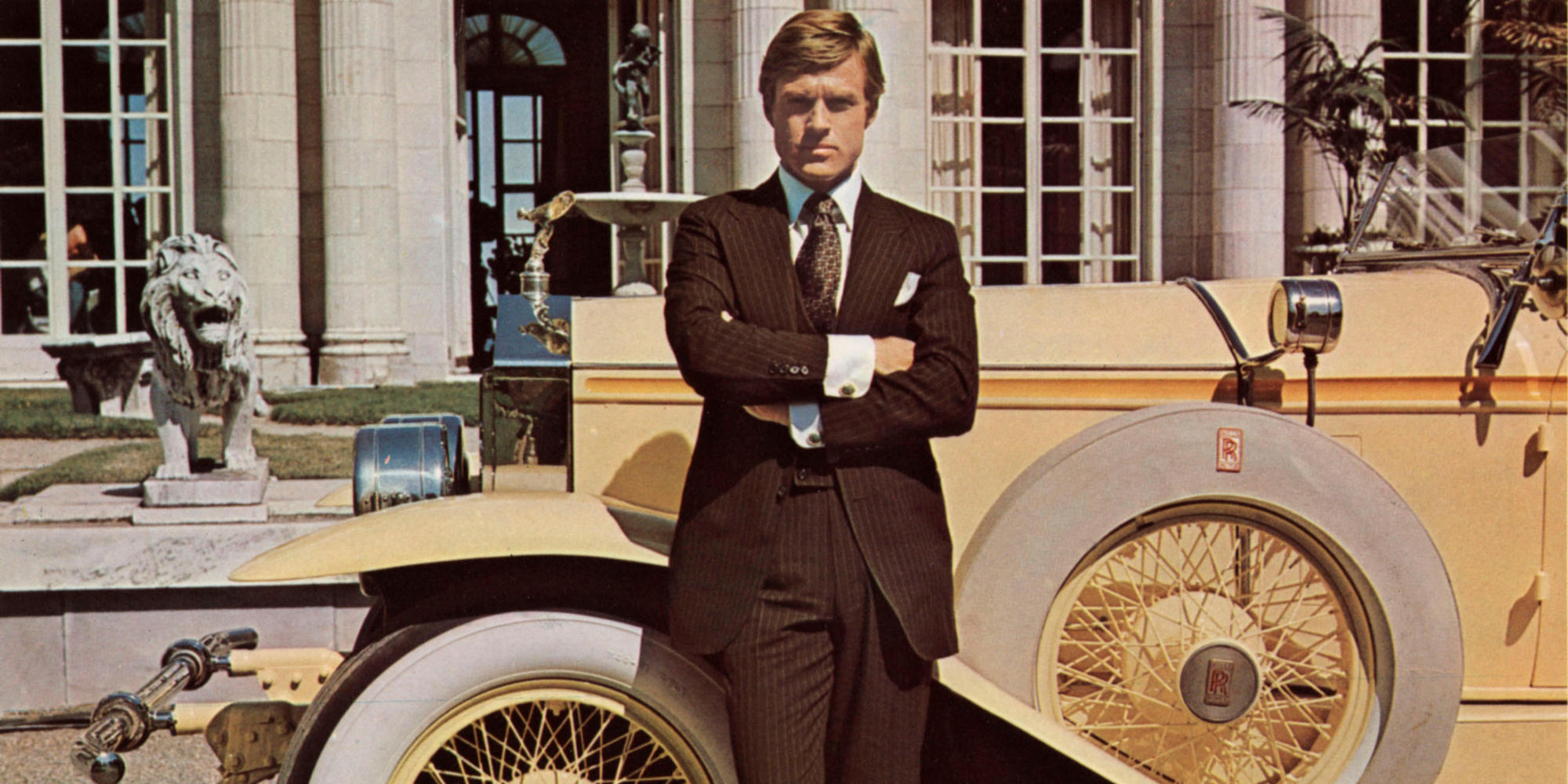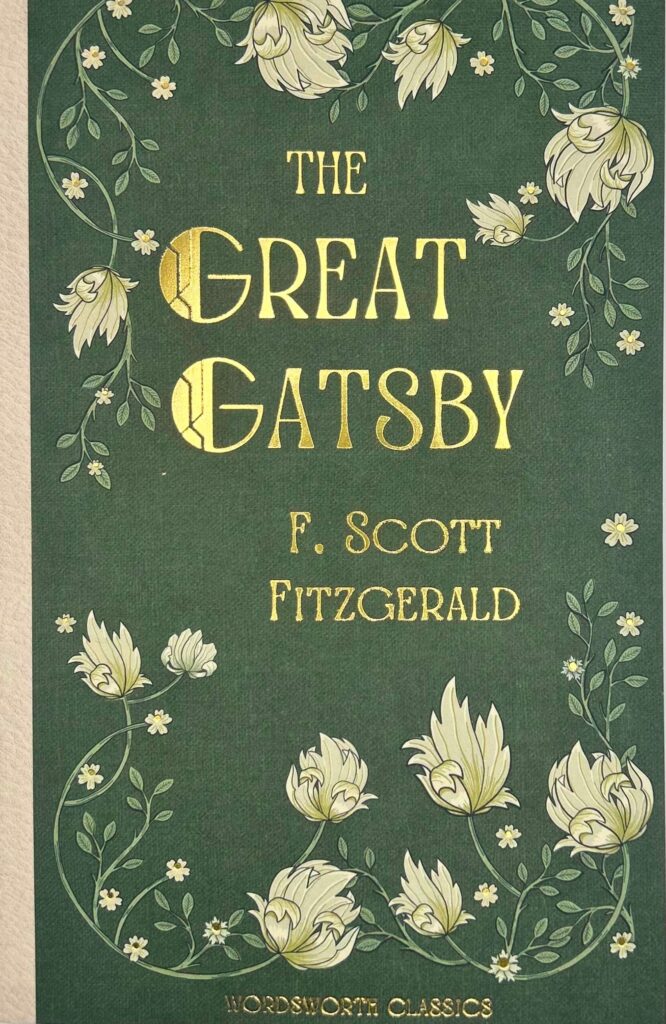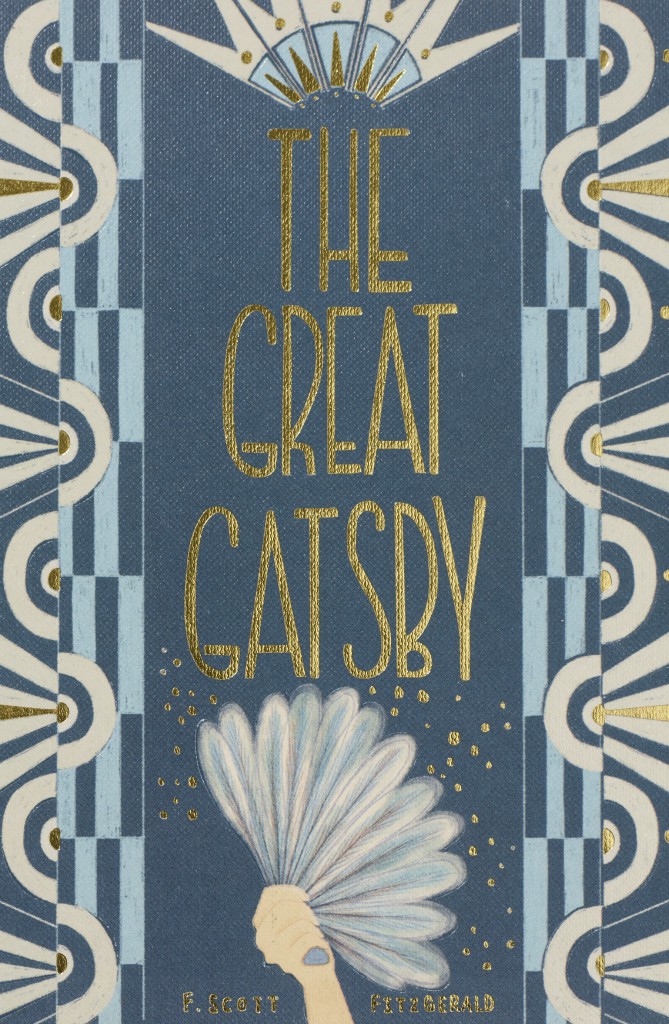
Sally Minogue looks at The Great Gatsby
In the year when Scott Fitzgerald’s The Great Gatsby is released from American copyright, Sally Minogue considers the novel’s seductive power.
To begin with the ending: there can scarcely be a more memorable last line to a novel than ‘So we beat on, boats against the current, borne back ceaselessly into the past’. And while I am revealing the ending here, I am giving nothing away, since it stands at an opaque tangent to the events of the novel itself, containing both contradictions and multitudes (like that other great American opus, Walt Whitman’s Leaves of Grass). I shall return to this ending.
In Britain, the text of The Great Gatsby has been in the public domain for many years, but in America, with its more exacting law in this area, it has only just been released from copyright. There will now be a flood of rewritings, gendered re-readings, fan fiction responses, musical adaptations, and downright crazy new versions – a Muppets Gatsby, anyone? (see www.theguardian.com, January 29 2021). Those multitudes again. But first, let’s look at the thing itself, 25 million copies sold and counting, and acclaimed regularly as the greatest American novel. Scott Fitzgerald’s third novel, it was conceived in 1922/23 when he was in his mid-twenties, living on Great Neck, Long Island, New York (the basis of West Egg, the location of Gatsby’s mansion in the novel). Fitzgerald might not have been entirely surprised at its long-term success, since that matches his high ambition when he first conceived it: ‘to write something new – something extraordinary and beautiful and simple and intricately patterned’. When he began the novel in earnest in 1924, that proud writerly intent was still there, for ‘a consciously artistic achievement’, ‘a purely creative work’. At the request of his editor Maxwell Perkins, the submitted manuscript then underwent extensive revision. Fitzgerald’s final text was submitted in February 1925, to be published only two months later. I emphasise these details of vision and revision, because the novel as it has come down to us through the years feels fully-formed, a work that couldn’t be other than it is. Yet even the title, which has become iconic, a shorthand for the ironic contradictions between dream and disillusionment, was not fixed till the last minute. The alternatives that Fitzgerald considered now seem odd to us – Trimalchio (a reference to an orgiastic character in the Satyricon), Under the Red, White and Blue, The High-Bouncing Lover, amongst many others. They don’t trip off the tongue, and it seems unlikely that they would have entered the public imagination.
The finally agreed title puts Gatsby eponymously centre stage, pre-visaging tragedy, while the possible ironies in ‘Great’ offer an undercutting of any such gravitas. For this is a slim volume, its very lightness in the hand betraying something of Gatsby’s insubstantiality. Weighing in at just under 50,000 words, it barely meets the length criterion that makes it a novel rather than a novella. That is not to say that it is a slight novel: remember all that really hard work grafting and crafting by Fitzgerald, and the novel’s continuing appeal to myriad readers, its ability to continuously reinvent itself. This is the more remarkable since at first read it seems so rooted in a particular time and place. As it turns out, those roots are shallow.
The Great Gatsby is all about the cultural politics of surface. Gatsby recreates himself as an alter ego, in the still very recent tradition of the immigrant’s American dream, as his altered surname suggests. Narratively, the whole of the novel is played out in retrospect, but not in a straight line. Nick Carraway unrolls his story from the moment of his first awareness of his neighbour Gatsby, then at key moments he jumps the temporal bounds and takes us ‘forward’ to a later scene which alters our understanding of what has gone before. But Nick is himself recounting what Gatsby has told him; the layers of uncertainty redouble, and we find ourselves having to adapt to different versions of the truth, until eventually we realise that the whole moral and human landscape in the novel is built on sand. The circumstantial details of events, which at first might seem to be highly culturally specific, gesture towards a shallowness at the centre of things, not just on their surface. The ‘valley of ashes’ where the luckless George Wilson and his wife Myrtle live lies a short train or car journey from the opulent regions of East and West Egg, opposed points on the same continuum; by the end of the novel we see both come to dust. But there is no simple equation here, with death the great leveller, the mighty fallen to the same level as the lowly. There are no mighty: all is finally meretricious.
In a double bind in the narrative, as the mirage that is Gatsby fades, we see him become the more fully delineated by his desire for Daisy. He has made himself into the man he wished he could have been when he first met her, with no qualms about how he does that. Now he has to make her believe in that man. The great panoply of his mansion, with its ‘“Merton College Library”’, its Marie Antoinette music rooms and its Adam study, all vying pointless in their attempts at period authenticity, has been chosen not only in a poignant attempt to impress, but also because it sits directly opposite Daisy’s house across the sound in East Egg. In one sense, Gatsby has judged Daisy well, though it is not the nouveau riche house that will capture her (she has after all grown up with ‘old’ money), but Gatsby’s shirts, which he pours out before her in his bedroom like a libation:
He took out a pile of shirts and began throwing them, one by one, before us, shirts of sheer linen and thick silk and fine flannel, which lost their folds as they fell and covered the table in many-coloured disarray … the soft rich heap mounted higher – shirts with stripes and scrolls and plaids in coral and apple-green and lavender and faint orange, with monograms of Indian blue. Suddenly, with a strained sound, Daisy bent her head into the shirts and began to cry stormily.
‘They’re such beautiful shirts,’ she sobbed, her voice muffled in the thick folds. ‘It makes me sad because I’ve never seen such – such beautiful shirts before.’ (59)
This has often been taken as evidence of Daisy’s shallowness, but that is to misunderstand both her and Fitzgerald. The shirts are part of Gatsby’s person, they have a material beauty to answer to the intense feeling she once had for him, but which she sacrificed – for what? For her marriage to the brutish Tom, to old money and a life she understood. She didn’t even really know that Gatsby couldn’t have offered her those same things on his return from the war. After all, he ‘had deliberately … let [Daisy] believe that he was a person from much the same strata as herself – that he was fully able to take care of her’. (95) But she grew bored while waiting. This is her real shallowness, and her tears are for that loss. Paradoxically, in mourning for that, she makes herself nobler. The scene is a love scene, through a dressing rather than an undressing, with Nick a necessary observer and go-between.
It is with something of a shock that we realize that the initial affair between Gatsby and Daisy was only five years previously (71). Even in the speeding pace of the early 20th century, that seems too brief a time in which a love has been founded, inexplicably abandoned, ruined, romanticised, and rediscovered. Alain Fournier’s Le Grand Meaulnes (1913), on which the title of The Great Gatsby is modelled, and which plays out a similar story of a lost love which becomes an obsession, takes place over a similar period of time. Both novels are more about the dream itself than its fulfilment, and both suggest an element of self-deception in their ‘heroes’. The brevity of the time elapsed signals the impatience of the new world and at the same time the self-deception involved in each man’s dream. Neither thinks properly about the woman their dream is built around. In Gatsby’s case, Daisy can’t possibly live up to the image of her he has created.
Indeed she doesn’t, since when she kills Myrtle when driving Gatsby’s car, she appears to give no thought to what she has done. Gatsby in turn thinks only of the effect on Daisy. Here we see the morally empty heart of the novel. Gatsby’s love of Daisy proves to be solid, in so far as he accepts the consequences of her killing Myrtle while driving his car, and takes that responsibility on himself. But his taking responsibility is in inverse proportion to his lack of any care about Myrtle’s being killed. He might almost have said, ‘That’s but a trifle here’, as he muses on how Daisy is dealing with the blow – that blow being that she, Daisy, has killed Myrtle with the automobile. It is the complete unconcern of both Gatsby and Daisy about that death that opens up the moral void, not in the novel, which exposes it, but in the lives of its main protagonists. The morally exhausted values Fitzgerald reveals, then, are not particular to the place or age he depicts. The brilliantly observed details of that particular historical moment do, however, provide a perfect fit for a certain sort of emptiness.
At the centre of this is the narrator Nick Carraway. Fitzgerald goes to some lengths to persuade us that we are in a safe pair of hands with this product of an old mid-Western family, Yale-educated, repository of values of tolerance but also a man of conscience. Carraway even confides, ‘I am one of the few honest people that I have ever known’. Yet that comes only a couple of paragraphs after he has told us that Jordan Baker, his temporary amour, ‘was incurably dishonest’, but that ‘It made no difference to me. Dishonesty in a woman is a thing you never blame deeply – I was casually sorry, and then I forgot.’ (38-39) Gender stereotyping aside, there’s immediately a deep contradiction here. Nick emerges as more of a cipher than a man of solidity, taking on the colour of his surroundings, his sins those of omission rather than commission. In the suddenly squalid and brutal scene in the hotel room in Chapter Two, when Tom Buchanan breaks Myrtle’s nose, our narrator’s reaction is to absent himself: ‘Then Mr McKee turned and continued on out the door. Taking my hat from the chandelier, I followed.’ A short ellipsis later, he is ‘standing beside [McKee’s] bed and he was sitting up between the sheets, clad in his underwear, with a great portfolio in his hands’. (25-26) This brief glimpse into Nick’s personal and sexual life is perhaps the only unedited view we have of him. But what we remember from the chapter is that at a moment of violence to a woman, he did nothing. The same is true at the central moment of moral dereliction in the novel, the running down of Myrtle by Gatsby’s automobile. His concern then is ultimately for Gatsby, and his advice is that he should go away, in order to escape the consequences of the car accident. And it is at this point in the narrative that we hear the full story of Gatsby’s love for Daisy, who in his first memory of her is described as ‘gleaming like silver, safe and proud above the hot struggles of the poor’. (95) As indeed she remains. Nick as narrator is then responsible for so much in our understanding of events, yet is himself light as a – well, a caraway seed. He carries us away on Fitzgerald’s gorgeous prose, seduces us, informs us, and in the end lets us down.
Yet, in this novel of many contradictions, just as something pure remains at the heart of Gatsby’s love of Daisy, so Nick is in some sense redeemed for us by his helpless loyalty to and grief for Gatsby:
I found myself on Gatsby’s side, and alone. … as he lay in his house and didn’t move or breathe or speak, hour upon hour, it grew upon me that I was responsible, because no-one else was interested – interested, I mean, with that intense personal interest to which everyone has some vague right at the end. …
I wanted to get somebody for him. I wanted to go into the room where he lay and reassure him. ‘I’ll get somebody for you, Gatsby. Don’t worry. Just trust me and I’ll get somebody for you – ’ (104)
But there’s no one to get. Daisy never re-appears, even for the funeral. Gatsby’s father comes, and is cheered by the trappings of richness. Before the funeral, Nick asks the minister to wait a half-hour. ‘But it wasn’t any use. Nobody came.’ (111)
This hollowness is the most difficult thing to represent in any adaptation. It might be done in a musical, and apparently one is underway, with Florence, of Florence and the Machine, as the composer. There have already, of course, been some significant movie versions. Perhaps it is because it’s my generation, but Robert Redford seemed the ideal Gatsby, Mia Farrow his perfect foil. Redford had the glamour, Farrow the gossamer-wing insubstantiality. But no version can replace Nick Carraway’s narration or Fitzgerald’s breathtaking prose; they only work in the written word.
I’ve had some difficulty myself in finding the right words for The Great Gatsby. It has kept slipping away from me, its real secrets just beyond the grasp of utterance – much as Nick himself feels when he has just heard Gatsby’s highly romanticised description of the first time he kissed Daisy:
Through all he said … I was reminded of something … For a moment a phrase tried to take shape in my mouth and my lips parted like a dumb man’s, as though there was more struggling upon them than a wisp of startled air. But they made no sound, and what I had almost remembered was uncommunicable forever. (71)
If The Great Gatsby leaves us feeling like this, it is perhaps more a mark of its greatness than otherwise. Like the best modernist works, it is trying to say something that is finally unutterable.
What Fitzgerald did utter, triumphantly, was that marvellous ending to the novel. In spite of all that has gone before, the cynicism, the life founded on untruth, the lack of care for another human being, the sheer brutality, he has made us believe that even the empty heart and the desiccated conscience can be redeemed by love, hope and a final innocence. For the last page of The Great Gatsby indeed revives an innocent hope, the same that was felt by those pioneers first approaching the New World, Long Island then, Long Island now:
I became aware of the old island here that flowered once for Dutch sailors’ eyes – a fresh green breast of the new world. Its vanished trees, the trees that had made way for Gatsby’s house, had once pandered in whispers to the last and greatest of all human dreams; for a transitory enchanted moment, man must have held his breath in the presence of this continent, compelled into an aesthetic contemplation he neither understood nor desired, face to face for the last time in history with something commensurate to his capacity for wonder. (115)[i]
In truth, this is a wonderful passage which strips away any readerly scepticism, even when that scepticism has been nourished by the novel itself. It is Fitzgerald’s great gift that he is able to conjure this wonder at the very end of a work that consistently shows us the underbelly of humanity. The one, he is telling us, does not contradict the other; both are part of being human, both are possible. And thus it is that ‘we beat on, boats against the current’. There is something noble about that enterprise, even as it is doomed to failure – ‘borne back ceaselessly into the past’.
Image: Robert Redford in the 1974 film of The Great Gatsby.
Credit: Collection Christophel / Alamy Stock Photo
As I was writing my first draft of this blog, the Composer of the Week on BBC Radio Three, presented by Donald MacLeod, was Aaron Copland. Copland, it turns out, was born just four years after Fitzgerald, though he lived twice as long. Listening to Copland helped me to understand that unlikely strain of innocence in Fitzgerald’s novel. Copland was a complex figure who was investigated by the FBI in the 1950s for his leftist sympathies and had his great work, A Lincoln Portrait, withdrawn from the inaugural concert for President Eisenhower. Yet one could not find a composer who expresses so powerfully a triumphantly optimistic love of his country. The same paradox is to be found in Fitzgerald. The Copland programmes, which I recommend highly, can be found on BBC Sounds.
[i] I’m aware in writing this that innocence may be a strange word to use in light of the way the first settlers of America ravaged the rights of its indigenous people. Nonetheless, a version of innocence is what Fitzgerald wants to attribute to the Dutch sailors here, and to my mind in his fictional world he makes this plausible.
Books associated with this article

The Great Gatsby
F. Scott Fitzgerald
